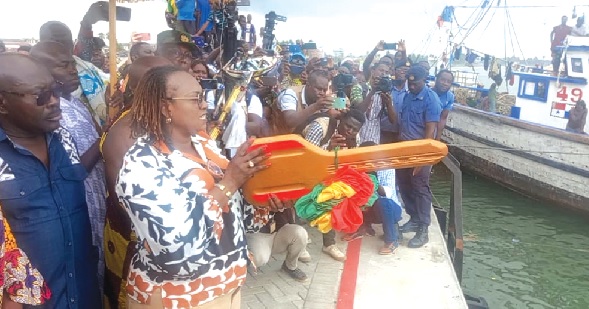
2023 Fishing season closed
This season’s closed season for fishing has begun following the symbolic locking of the sea at Elmina by the Minister of Fisheries and Aquaculture Development, Mavis Hawa Koomson, last Saturday.
By this, artisanal canoes will be off the sea for one month, from July 1 to July 31, while industrial trawlers would be off from July 1 to August 31.
The closed season is part of measures to ensure recovery and rebuilding of the critically low fishery stocks in accordance with Section 84 of the Fisheries Act, 2000 (Act 625).
Speaking at the symbolic event, the Fisheries Minister also announced that Côte d'Ivoire would simultaneously observe this year's closed season which began yesterday together with Ghana.
Under the auspices of the joint Fisheries Committee for West and Central (FCWC) gulf, joint fishing patrol operations would ensure compliance with the closed season.
Impact
Mrs Koomson said the livelihood of the three million people and the over 180 fishing communities were being threatened by the continuous dwindling fishery stock.
She noted that activities of over fishing and over exploitation using illegal unreported and unregulated fishing practices continued to worsen, and that the closed season was to ensure recovery and rebuilding to prevent collapse of the stocks.
She further said the result of a biological survey undertaken in 2022 indicated the fish caught were bigger than previous years, noting further that the continuous closure of the sea, seven years for the industrial and four years for the artisanal and inshore fleet had shown a significant positive impact towards stocks recovery.
Sharing the impact of the exercise, the Fisheries Minister said, for instance, that canoe landings were higher after the closed period, and that fish caught were bigger, an indication that the closed season should be implemented for many years to achieve the needed impact.
Alternative livelihoods
Mrs Koomson stated that as a way of reducing the economic hardships in the fishing communities, the ministry in collaboration with the Ghana Fisheries Recovery Activity had launched an alternative livelihood support to train 1,350 in employable skills, including masonry, dressmaking, and electronics.
The training, she said, would be scaled up to include 8,350 beneficiaries who would be supported after the training to set up their businesses.
Meanwhile, the ministry has distributed food items in some of the communities to alleviate the plight of the fisherfolk during the period.
Cote d’Ivoire joining in the intervention is an attempt to ultimately implement a sub-regional closed season as part of measures to replenish the dwindling fishery stock.
Togo and Benin are expected to participate in the closed season next year.
Mrs Koomson said a joint implementation of the closed season by Côte d'Ivoire was an indication that her working visit to appeal to the fishery managers had started yielding results.
She appealed to security agencies charged with the responsibility of ensuring that the closed season was adhered to, worked collaboratively to ensure compliance.
Mrs Koomson thanked stakeholders, including fishermen and processors, scientific working bodies, both national and international; civil society organisations and security agencies for the support in ensuring successful closed seasons.
The Central Regional Minister, Justina Marigold Assan, thanked the President for the fishing harbour which had boosted fishing activities in the area.
The Paramount Chief of Elmina, Nana Kwadwo Conduah, called for the establishment of a fisheries bank to support those engaged in fish-related business.
Meanwhile, there was near chaos when a canoe with suspected illegal fishing gear landed at the harbour after the programme.
Security personnel in an attempt to arrest the boat owner were resisted by some community members which nearly resulted in a clash.
Eventually, the police managed to arrest the boat owner and dispersed the crowd.
